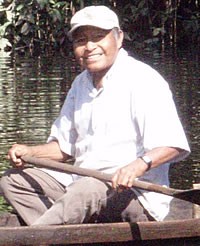Quichua, Northern Pastaza in Ecuador

Photo Source:
Anonymous
|
Send Joshua Project a map of this people group.
|
| People Name: | Quichua, Northern Pastaza |
| Country: | Ecuador |
| 10/40 Window: | No |
| Population: | 11,000 |
| World Population: | 13,400 |
| Primary Language: | Quichua, Northern Pastaza |
| Primary Religion: | Christianity |
| Christian Adherents: | 98.00 % |
| Evangelicals: | 2.00 % |
| Scripture: | New Testament |
| Ministry Resources: | Yes |
| Jesus Film: | Yes |
| Audio Recordings: | Yes |
| People Cluster: | Quechua |
| Affinity Bloc: | Latin-Caribbean Americans |
| Progress Level: |
|
Introduction / History
It is the general consensus that Quichuas are in Ecuador and Quechuas in Peru. For the most part this is true, but the Tigre Quichuas of Peru live in a territory that was Ecuadorian until a war in the 1940s. Nevertheless, you may find information on them under "Tigre Quechua" or "Inga" (what they call their own language). Other forms of spelling found include Tigri, Kechwa, Kichwa, and Inka. It is widely believed their language is the same as "Quechua, Northern Pastaza," (aka. "Quechua del Pastaza") but we noticed several subtle differences in what words the Tigre Quichuas said and our "Quechua del Pastaza" dictionary (SIL). We also heard that the "Quechua del Pastaza" New Testament is difficult to understand from the some Tigre Quichuas. Most Tigre Quichuas speak Spanish, but Tigre Quichua is their heart language and understand better in that tongue.
Until recently all evangelical efforts to reach the Tigre Quichuas were exclusively in Spanish but in the last few years missionary pastors from Mision Mundial de Lugares Lejanos (which is said to have an office in Iquitos, Peru. Perhaps it is no longer existent.) among a few others have preached to nearly all communities on the upper Tigre River in Quichua as well as Spanish and have planted 6 churches on the upper Tigre River boasting some 200 members collectively. (As of July '07)
Where Are they Located?
They are located on the upper Tigre River in all communities north of the district capital, Intuto, which is also the largest town on the Tigre. There are said to be some scattered Quichuas through the towns on the lower Tigre River as well. The most northern (and upper) Quichua community on the Tigre River is 12 de Octubre. The towns of 28 de Julio, Pampa Hermosa, and Paiche Playa are said to have pure Quichua populations.
What Are Their Lives Like?
The people seem to revolve around the planting and harvest of yucca, of which they mostly use for making an fermented drink called masato. Alcoholism is rampant. Though many towns have livestock (cattle, swine, and chickens), many man hunt wildlife and fish to feed their families. Though divorce is said to be rare, premarital cohabitation is common. People seem to live from day-to-day, concerned with immediate wants or necessities and little or no thought of the future. Several larger towns on the Tigre River boast electricity.
What Are Their Beliefs?
Before Roman Catholic missionaries came to the Tigre Quichuas they were purely animistic, said to have believed, worshipped, and feared fantasy-like animals of the wilderness. Today most claim Roman Catholicism but very few practice outside of infant baptisms. There is a general belief in a supreme deity (the Father), and his son (Jesus), and wife (the Virgin). Communication with the dead and magic are practiced by shamans and commoners.
What Are Their Needs?
Malaria is severe in the area and the people have little education about clinical medicine. There is a lack of a balanced diet as the people don't know how (and/or don't have the desire) to plant crops outside of yucca and plantains. Vegetables like tomatoes, carrots, and onions are common in most of Peru, but strangers to the upper Tigre.
Prayer Points
Pray for the believers to be discipled and share their faith with the rest of the Tigre Quichuas and other indigenous in the area.
The evangelical believers are crippled by church traditions (such as the belief in the need for a "professional pastor") that slows down evangelism and keeps them from growing individually and looking outward to plant more churches and multiply. Pray they would instead embrace a Biblical church model and grow.
Many lost people are drunk so often it prevents them from being able to understand the Gospel. Pray for this to change.